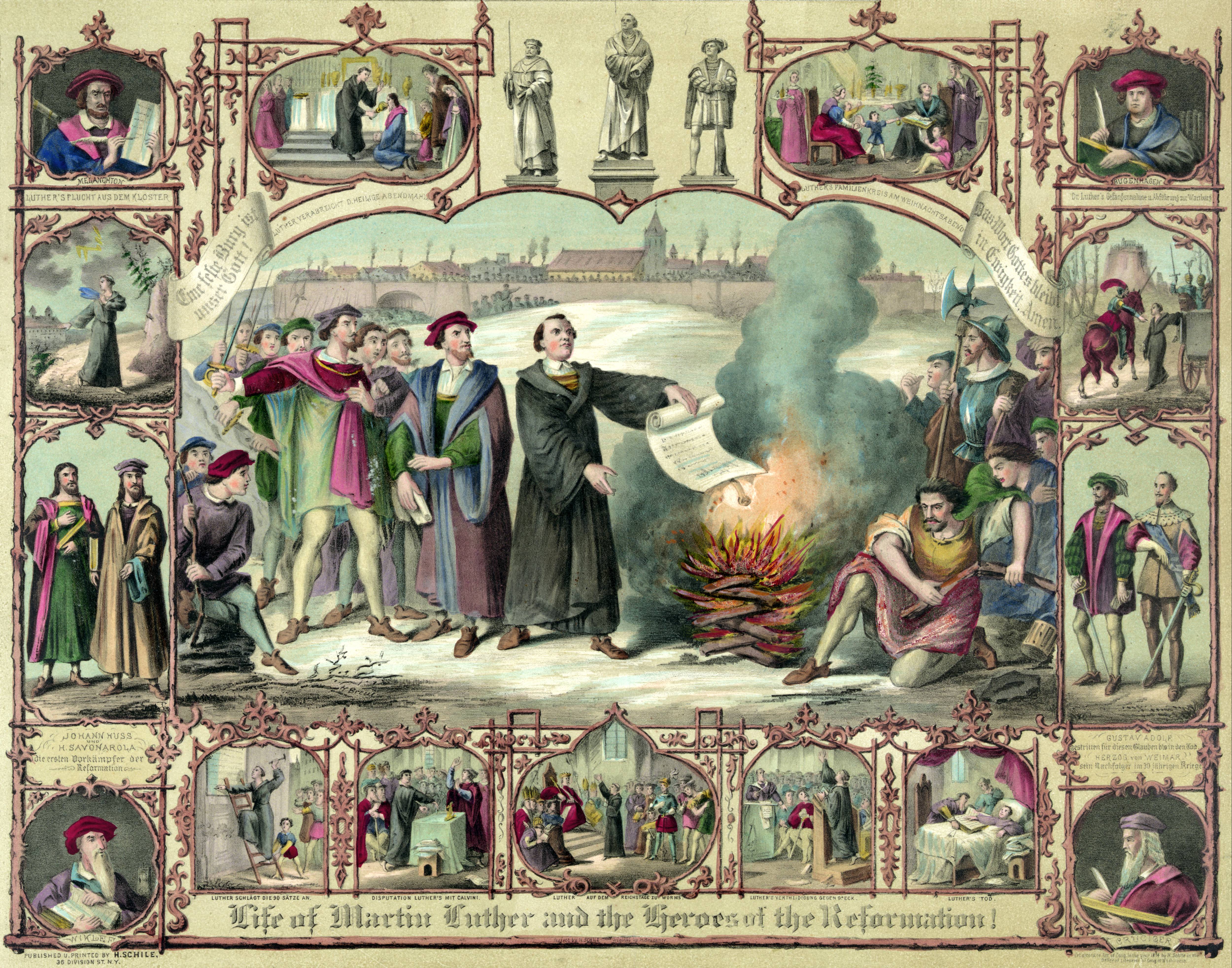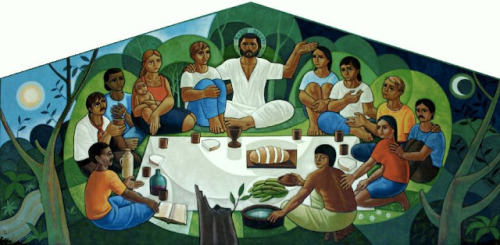Roman Catholic, Protestant, and ecumenical groups around the world are using the year 2017 to think through the gifts and sorrows of what became known as the Protestant Reformation. You can use this worship resource guide to become more attentive to how the Holy Spirit renews Christ’s worldwide body in and among different Christian traditions. The guide has six parts:
- Commemorate explains why scholars and pastors suggest observing the five hundredth anniversary as a commemoration rather than a celebration.
- Gifts in Common looks at what Roman Catholics and Protestants share.
- Humility and Lament gives ideas for bringing sectarian pain and conflict to God in worship
- Music suggests songs about Reformation themes from many cultures.
- Sermon Planning offers sermon starters based on history, the psalms, and contemporary preachers.
- Service and Series Planning offers outlines based on history, the psalms, and contemporary sources.
 Commemorate
Commemorate
When Martin Luther posted his ninety-five theses, he hoped to spark discussion and renewal within his beloved church. He wanted people to discover the wideness of God’s grace in Christ. He longed for them to see themselves as above all else baptized into Christ. The resulting movements led by Luther, John Calvin, Huldrych Zwingli, and other Reformers helped renew focus on Scripture, faith, grace, Christ, and God’s glory. It also led to persecution, death, conflict, and perpetual fragmentation among Christ’s body.
That’s why scholars and pastors suggest exploring the Reformation’s complexity rather than celebrating stereotypes in worship. Stereotyping for Roman Catholics might mean talking about those “godless Protestants” who should “come home to Rome.” For Protestants it might mean making Reformation Sunday all about Martin Luther or those five solas “that Catholics don’t understand.”
“Long before the five hundredth anniversary of the Reformation is ever commemorated in a public worship service, it should be contemplated in the prayer-soaked conversations of pastoral care teams, discipleship groups, and conversations among pastors and elders,” John D. Witvliet writes in Reformed Worship.
Commemorating the Reformation for the 500th Time: A Compelling Pastoral and Discipleship Opportunity In this essay, John D. Witvliet explains how to use the 2017 commemoration as an invitation to learning, growth, and mutual discipleship.
Should Pope Francis Celebrate the Reformation? Fr. Dwight Longenecker writes that the Reformation both splintered western Christendom and led the Roman Catholic church to renewal and missionary work.
Shaping a Reformation Commemoration Prayer or Worship Service In this 59-minute recording, six pastors from several countries discuss the Reformers’ insights and limitations. Scholars and pastors also recognize that that “the Protestant Reformation” was in fact many reformations with diverse streams in different cultures.
Our 95 Theses: Hispanic Perspectives on the Protestant Reformation This story highlights a new book by Latino and Latina Protestants, Roman Catholics, and Pentecostals about how the Protestant Reformation surged among marginalized and exiled people.
Protestante Digital This is the best website for five-hundredth-anniversary materials in Spanish.
Reformation Sunday worship resources for Presbyterians include a reminder that Presbyterians celebrated the five hundredth birthday of John Knox on October 26, 2014, and that the United Methodist Church has used Reformation Sunday to observe the three hundredth anniversaries of the births of John and Charles Wesley. Many Reformed denominations will observe 2018 as the five hundredth anniversary of the Canons of Dort. This worship service suggests how to pastorally capture the doctrinal nuances.
 Gifts in Common
Gifts in Common
Vatican II led to changes that help Roman Catholics and Protestants remember what we share as part of the church universal. Paul Neeley’s Global Christian Worship blog gathers visual art about our common gifts of baptism, the Lord’s Supper, and the Apostles’ Creed. Reformed Worship archives liturgies, dramas, and more for the Lord’s Prayer. Reading more Scripture in worship and observing the Christian year help congregations find their identities within the whole story of Scripture.
If your church neglects any of these common gifts—baptism, the Lord’s Supper, the Apostles’ Creed, the Lord’s Prayer, public Bible reading, the Christian year—then 2017 would be a good time to focus on them.
The apostle Paul reminds us that the Spirit gives different gifts to different parts of the body so that the whole church grows and builds itself up in love. You can use that perspective to glean from other denominations’ suggested worship resources.
Christian Reformed Church in North America Besides worship helps, these five hundredth anniversary resources include key education aids, events, and publications.
Evangelical Lutheran Church in America (ELCA) Check out these thirty-two great ideas. The Lutheran World Federation has made creation one of its main anniversary themes.
Reformed Church in America This RCA list includes litanies, sermon ideas, and service plans.
United Methodist Church The UMC has gathered many Reformation Sunday resources.
U.S. Conference of Catholic Bishops This group recommends eight resources to work for greater unity during the five hundredth anniversary of the Protestant Reformation.
 Humility and Lament
Humility and Lament
For all the progress and dialogue between Roman Catholics and Protestants, much remains to lament. Northern Ireland and Mexico are the best-known examples of Catholic-Protestant conflict. Families all over the world deal with grief, anger, and isolation when Roman Catholic loved ones become Protestant or vice versa. We’re all probably guilty of talking about shortfalls in other Christian traditions while neglecting to ask God what we can learn from them or praying for God to bless them.
The Reformation led many Christians to rediscover the psalms as a guide to prayer and congregational singing. Here are examples of how the psalms are helping Christians lament what divides them and hope in God’s healing.
Irish Presbyterians on Singing Celtic Psalms This conversation with two musically gifted Presbyterian pastors reveals how singing Celtic psalms helps bridge communities in troubled places.
Celtic Psalms: Finding Light in Darkness In this fifty-three-minute video, Irish Catholics and Presbyterians lead a psalm-based vespers service.
Common Prayer: From Conflict to Communion This liturgy developed by Roman Catholics and Lutherans to commemorate the Reformation anniversary includes a prayer of repentance and chanting Psalm 130. The liturgy is available in 13 languages.
re:Worship This blog for worship planners offers a litany, paraphrase, and adaptation of Psalm 13, one of the best-known lament psalms. It may provide ideas for lamenting religious divisions in your context.
Recent ecumenical services designed to commemorate the Reformation use strong visuals to help people move from lament to healing.
The Vatican Pontifical Council for Promoting Christian Unity This group convened an ecumenical committee to develop a worship service for the annual Week of Prayer for Christian Unity. It includes suggestions for how to physically build and tear down a wall during worship.
Healing of Memories, St. Michael’s Church, Hildesheim, Germany This service took place in a cathedral shared by a Roman Catholic and a Protestant congregation since 1542. A wall divided their worship spaces until 2006. As the Healing of Memories service began, the presiders stood in front of a three-dimensional cross lying on its side, blocking access to the altar. Later, a group of young adults lifted the heavy cross and set it upright. Then everyone sang a Taizé song in German (“In the Lord I’ll Be Ever Thankful”). This service included participation by Orthodox clergy, which is significant considering the Great Schism in 1054 that led to separate Orthodox and Roman Catholic traditions.
Fran Pratt plans and leads worship at Austin Vineyard Church in Texas. She offers litanies keyed to the lectionary and to relevant topics such as lamenting false accusations found in fake news.
 Music
Music
All the hymns, songs, and short songs listed here reflect Reformation themes: the five solas (Scripture alone, faith alone, grace alone, Christ alone, and God’s glory alone), lament and prayers for unity,, and the priesthood of all believers.
About half are widely sung by Roman Catholics and Protestants in many cultures. The rest may introduce you to the heart language of Christians from another era or culture. All are listed on Hymnary.org. Check out its features and tutorials to get the most out of this amazing resource.
Hymns
“A Mighty Fortress Is Our God,” Martin Luther. Protestants who think of this as the quintessential Reformation hymn are surprised to learn that many Roman Catholic congregations sing it too. It’s based on Psalm 46.
“Listen, God Is Calling,” Tanzanian traditional hymn. Sing this call-and-response song before reading the Bible in worship. It has a lively refrain: “Listen, God is calling, through the Word inviting, offering forgiveness, comfort, and joy.”
“Faith Begins By Letting Go,” Carl P. Daw Jr. This thoughtful hymn about faith is based on James 1:17 and John Calvin’s Institutes of the Christian Religion, III.2.7. It’s set to the tune (LUX PRIMA) that many hymnals use for “Christ, Whose Glory Fills the Skies.”
“Lead Me, Guide Me,” Doris Akers. This African American gospel song is a faithful plea for God’s grace and presence in daily life.
“Your Grace Is Enough,” Matt Maher. This CCLI favorite is a contemporary expression of depending on God’s promise to be gracious.
“Out of the Depths I Cry To You.” There are dozens of hymns based on Psalm 130 that begin “Out of the depths I cry.” Several are sung to a tune Martin Luther composed: AUS TIEFER NOT.
“Savior of the Nations, Come,” St. Ambrose. Martin Luther translated this fourth-century hymn from Latin to German. Luther cared deeply for the poor and others marginalized by the church. This hymn of incarnation marvels that “Christ laid down his majesty, passed through dark Gethsemane.”
“Neither Death nor Life,” Marty Haugen. Roman Catholics and Protestants sing this folk hymn based on the Romans 8 promise that nothing can separate us from Christ, who redeems all of creation.
“Imagine,” Kristyn Getty. This contemporary hymn, often sung at Advent, expresses wonder that Christ is a King who “hears the voice of the hungry, . . . sees the tears of the suffering,” and calls us “to his side, just like a father and child.”
“Soli Deo Gloria,” Marty Haugen. The final verse of this folk hymn about God’s glory has these phrases: “A billion voices in one great song . . . in every culture and style and key . . . with Christ we praise you eternally.”
“Blest Are They, the Poor in Spirit,” David Haas. This song based on the Beatitudes appears in many Roman Catholic and Protestant hymnals. It expresses both lament and joy. Singing it may help you avoid the triumphalism that has sometimes marred Reformation commemorations in other centuries.
“Open Your Ears, O Faithful People,” Hasidic traditional. The Bible traces salvation history to show how God used a chosen people to bless the whole world. Martin Luther valued Scripture yet viewed Jews harshly. Singing this Israeli tune with lyrics about Scripture might help you lament that Reformation legacy.
“Praise the Lord Who Heals,” Norman Agatep. Sometimes we experience unity in Christ’s body. Other times we’re all too aware of schisms and conflicts among Christians. This song, well known among Filipino Catholics, invites us to bring our broken hearts to God, confident that God will heal.
“Ososo/Come Now, O Prince of Peace,” Kōn-yong Yi. The refrain for this Korean song is: “Come, O Lord Jesus; reconcile all people.”
“In Christ There Is No East or West,” John Oxenham. If you’re used to singing this classic hymn of unity to the tune ST. PETER (Reinagle), then check out an alternate tune, MCKEE, which has Irish and African American roots.
“God of the Prophets,” Denis Wortman. This classic hymn reflects the Reformation theme of the priesthood of all believers. Newer versions change the word sons to heirs.
"O Teach My Heart to Love Your Word," Abe & Liza Philip. This modern hymn celebrates the gift of scripture and points us to Jesus, the Word made flesh.
Short songs, choruses, and coritos
“Lord, to Whom Shall We Go?”, The Iona Community. Sing this before you read Scripture in worship.
“Dawk’yah towgyah/Take the Saving Word of God,” Kiowa song. This is good to sing before Scripture reading or after the sermon.
“We’ve Come This Far by Faith,” Albert A. Goodson. This African American gospel song works well after the sermon or for the sending.
“Tu fidelidad/I Depend upon Your Faithfulness,” Miguel Cassina. Learn more about this Mexican corito about God’s faithfulness.
“In the Lord I’ll Be Ever Thankful,” Taizé Community. Roman Catholics and Protestants often sing this song during communion.
“O Que Bueno/Oh How Good Is Christ the Lord,” Puerto Rican folk hymn. The repeated phrase “Glory be to Jesus” fits the Solus Christus and Soli Deo gloria themes.
“Somos uno en Cristo/We Are One in Christ Jesus,” anonymous. This Latin American corito is based on the Ephesians 4:4–6 call to continue in the unity of Scripture, discipleship, and the Holy Spirit’s care.
“Siyahamba/We Are Marching in the Light of God,” Zulu traditional song. This is a good song to end worship so congregrants go out into the world trusting in God’s promises.
More Reformation-themed songs
Choose contemporary CCLI songs for Reformation Sunday.
Hymnary.org and Calvin Institute of Christian Worship offer Reformation Day and All Saints’ Day song suggestions.
Find new and old songs on Reformation themes on Paul Neeley’s Global Christian Worship blog.
Lutherans around the world are using the five hundredth anniversary to remember that God through Christ is redeeming the whole creation, not just individual souls. The group Lutherans Restoring Creation offers a free download of hymn texts by Norman Habel, a Lutheran pastor in Australia. These new words to familiar tunes help worshipers sense God’s presence with us here on earth, our common home.
Five Solas Project: Check out new releases of five-hundredth-anniversary hymns, children’s songs, and choral music from the Brehm Center at Fuller Theological Seminary.
 color.jpg) Sermon Planning
Sermon Planning
Here are three ways to plan sermons that commemorate the Reformation:
- Learn from history. As the Gifts in Common section above suggests, this might include preaching about gifts historically shared among the church universal—baptism, the Lord’s Supper, the Apostles’ Creed, the Lord’s Prayer, public Bible reading, and the Christian year.
- Focus on the psalms.
- Learn from contemporary preachers and theologians.
History
Use Heidelberg Catechism sermon-starter ideas from the Center for Excellence in Preaching. Read a story about why to preach sermons based on a catechism.
Watch John Witvliet’s talk “The Interplay of Liturgy and Catechism in the Ministry of Martin Luther and John Calvin.” His handout details how Luther and Calvin used music and prayers to reinforce sermons on the Ten Commandments, Lord’s Prayer, Lord’s Supper, and baptism.
Luther, Calvin, and the Pope Meet. Use this readers’ theater in place of the sermon to explore the glory and pain of Reformation traditions.
Psalms
John Calvin called the book of Psalms “an anatomy of the human soul” because it covers the range of human emotions. Even laments about God’s promises not yet coming true are based on confidence in what God has already done.
Rejoicing in Lament: Four pastors and scholars discuss wrestling with incurable cancer, cancerous racism, and life in Christ. They offer insights into how congregations can follow the lead of the psalms by practicing candid lament as an essential part of deeply joyful worship.
This worship service plan, shaped by Psalm 46, ends with sermon notes. Read “Reformation Then and Now: Dismantling Walls Today,” a sermon by Dirk G. Lange based on Psalm 46.
Psalm 34 appears in the Year A Revised Common Lectionary (RCL) for All Saints’ Day and the Year B lectionary for Reformation Sunday. Eric Mathis, who ministers to Baptist students, offers sermon notes on Psalm 34 as “testimony embedded in the narrative of Scripture.”
Psalm 65 appears in the Year C RCL for Reformation Sunday. Sermons and commentaries from Baptist and Uniting Church of Australia preachers note God’s roles as creator, redeemer, and sustainer in the temple, world, and earth.
Contemporary advice
“What to preach about—or not—on Reformation Sunday”: This post from the Working Preacher blog reminds preachers not to make the sermon all about Martin Luther.
Working Preacher, a Lutheran website, offers dozens of sermon commentaries related to Reformation Sunday as well as podcasts on Reformation texts.
 Service and Series Planning
Service and Series Planning
In keeping with the Sermon Planning section above, these service and series planning resources are grouped by history, the psalms, and contemporary suggestions.
History
Craft a service that uses the top ten worship planning ideas from John Calvin.
Karin Maag’s book Lifting Hearts to the Lord: Worship with John Calvin in Sixteenth-Century Geneva has quotes from Calvin’s sermons and commentaries, prayers, pages from the Genevan Psalter, and eyewitness accounts from worshipers.
Read this conversation with Karin Maag on “Calvin’s Geneva and the 500th Protestant Reformation Anniversary.”
Psalms
This Psalms in Worship topic showcase gathers key insights and suggests print, music, and online resources for using biblical psalms in worship.
See Chapter 9 of Greg Scheer’s Essential Worship: a Handbook for Leaders for a great overview on responsorial psalms, metrical psalms, paraphrased psalms, and sung psalms from many cultures.
This psalm-based worship service focuses on Reformed themes: by grace alone, through faith alone, and in Christ alone.
Contemporary advice
Here’s a litany for reformation guided by the Holy Spirit.
Eyekons has compiled visual art, Reformation timelines, prayers, videos, and more. This comprehensive resource includes Anabaptist, Anglican, Lutheran, Presbyterian, and Reformed strains of the Protestant Reformation.
Making Our Own Confession is a complete service plan for Reformation Sunday or All Saints’ Day.
A Reformation Day Service for Canadian Churches can be adapted for other contexts.
This four-week series describes worship services from World Communion Sunday through Reformation Sunday.
This four-week series for October focuses on Reformation themes of God’s sovereignty, the authority of Scripture, salvation through faith, and God’s grace and glory.

